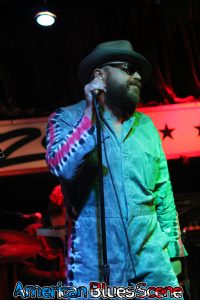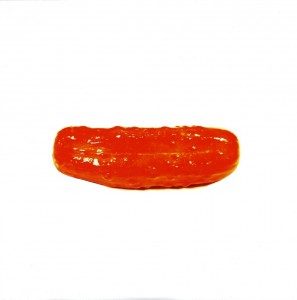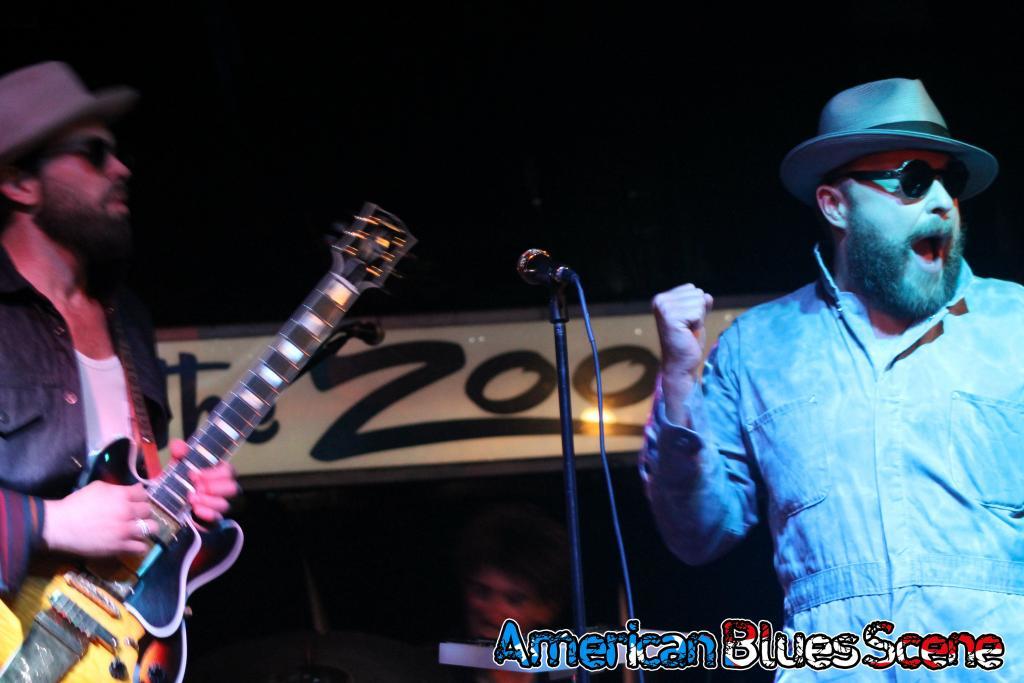Many blues and soul artists can trace their beginnings back to the country. They grew up as farm kids, or small town church goers, predominantly in the Southern United States. One doesn’t typically connect an award winning soul blues artist, to rural Idaho, however. John Németh is quickly changing that perception.
A soulful singer and blues harmonica player, Németh came from the mean streets of Boise, and played his first paid gig for a Catholic Daughters of America pinochle luncheon, at the age of 16. Fast forward 25 years, when we recently caught up with him at the legendary ZOO Bar in Lincoln, Nebraska. We were hoping for a 30 minute interview. What we got was a 4 hour conversation, history lesson, and a gyro dinner.
If there were a prototype of a “people person,” Németh is it. Quick with a smile, a hug, or a hearty handshake, he seemed to know everyone he encountered, by name. Listening in on his conversations with club co-owner, Pete Watters, and several fans, he appears to remember every gig, every song, every fan’s personal favorite everything. “I’ve played a lot of gigs here,” he professed, “But its been too long since the last one. I need to get here more often. I mean, what kid doesn’t love the Zoo?”
Dressed in a tie-dye jumpsuit, with a yin and yang symbol on the back, he didn’t quite look the part. But his reasoning was poignant. “A fan in Little Rock, Arkansas makes these for me,” he explained. “I have a bunch of them. First off, they’re really comfortable. Secondly, I feel that I need to shake things up from time to time. A lot of blues and soul singers see what their idols wore and followed suit. Pun intended. You can’t go completely style crazy all the time, but now and then it keeps people guessing. If Keith Richards changes his style, he makes sure that every media outlet in the world is aware of it. Me, I just like to be different once in a while.”
We found, through the course of our conversation, that he has a near eidetic memory, recalling almost every event in his life, and the people who influenced him, or were even present, at any given time. “For about a year and a half, I worked with Anson Funderburgh and the Rockets,” he recalled. “I took over for Sam Myers when he was beginning to lose his voice to throat cancer. Now that was a singer. Sam had that smooth, sexy, Mississippi voice, and I learned a lot from him. He was also an amazing drummer.” Németh continued, “As a vocalist, I need that beat to be there. There can’t be any glitches or missteps. I’ll always build my band around a great drummer.”
That’s about the time his philosophy on music, in general, started to unfurl. “My first memories of music were the Hungarian folk songs, which my dad would play every morning. At 6 am, every day, I’d be exposed to this amazing music. Hungarian folk music has these smooth, pentatonic layers that snake their way through the chaos of the melody. Its really a fascinating musical form and has stayed with me my whole life. I play it for the guys in the band while we’re on the road. There was also a lot of country music in the house when I was growing up. I had the album, Waylon & Willie, on vinyl and 8-track. I can sing you every song on that album. I mean right now, tonight. I also urge my band members to play the kind of music that they grew up on while we’re traveling. Listening to everyone’s favorite musical styles makes us more familiar with each other, and more tightly knit as a group. It worked for Santana, and it works for us.”
He went on to explain, “I think there is one great rhythm in the universe. A cosmic ‘om,’ that taps into the heart of each culture. The solid, passionate beats of African drums, are almost the same as the songs of Native Americans. The community drum, pounding out that rhythm, while the vocals just soar. Its the same rhythm you can feel coming from great blues artists. John Lee Hooker had it. Son House had it. My friend, Curtis Stigers, who is predominantly a jazz artist forced into more of a pop style by the record companies, has it. Its also the reason that we can play our music, anywhere in the world, and the audience gets it.”
“Speaking of record companies,” his voice becoming more animated, “I hate these so called music executives that keep saying, ‘the blues is dead.’ Do you think Muddy Waters would want to hear that? Do you think BB King or Albert King wanted to hear that? I know Buddy Guy doesn’t want to hear that because its just not true. We all take the music we’ve been influenced by and turn it into something we can call our own. We borrow the influences, not stealing them really, but borrowing them to create something new.”
“One thing I learned when I moved to the Bay Area, years ago, was that almost everyone I talked to had seen these great blues players, in small venues, with few patrons. I mean folks who are considered blues masters, all played in San Francisco and Oakland, but the people there just weren’t familiar with them yet. Was the blues dead then? Hell no. It just took the hippy movement and bands like Jefferson Airplane, the Grateful Dead, Janis Joplin and artists like that to reintroduce them to the music. When they caught on that these rock and roll bands were playing blues, people started filling clubs, and the West Coast blues got another jump start.”
Watters interjected, “Its been that way since the beginning of music. Brahms probably did it to Beethoven.”
Németh continued, “Exactly. There will always be the purists who say, ‘this isn’t blues or that isn’t blues,’ but it depends on where you are and what your experience in the blues is. In my personal experience, people in the Midwest; Lincoln, Kansas City, Chicago, they love to dance. If you can’t fill the dance floor, you’re doing something wrong. I’ve also played the Chitlin’ Circuit in Mississippi, and while the dance floors will be filled, they want their music to be more primal. When you play the juke joints in Mississippi, the music had better be as close to fucking as you can get.” He slyly added, “I hope you print that.”
Németh said, “I learned a long time ago, playing five to seven nights a week in the Boise clubs, that the purpose of playing live is to sell booze and sell sex. Sure, you might have a hit record, but its the club owners, who keep booking you, that keep you in business. Folks like Pete here, or Frank Hicks, who owns Knuckleheads Saloon in Kansas City work every bit as hard as any band on the road to promote the music. I mean, the ZOO has been booking blues bands here for over 40 years. Its been a major stop on the circuit for generations. And Frank, he saw a void in Kansas City when the Grand Emporium closed its doors, and he filled it. That place gets bigger and better all the time. Same with Suki and her club, Uncle Bo’s, in Topeka. Suki is great, a true fan of the music which makes sure everyone around her gets to hear it too.”
“People ask me, ‘John, why do you drink on stage? Nobody drinks on stage anymore.’ The answer is simple; I’m taking that life lesson about selling booze and promoting it. I’m not getting drunk on stage. I’m not drinking enough to adversely affect my performance. But if the customers see me with a whiskey on the rocks, they may want to buy one too. Sometimes its not the door money that impresses the owners, but how many bottles of liquor they can sell during the show. As far as selling sex, that’s all about the music. The blues is sexy. Soul is sexy. Its cool when a guy buys a CD to take home because your music made his girl feel some kind of way.”
Since he is known throughout the world for his soulful voice as well as his blistering harmonica playing, we asked Németh about his soul influences. “Oh, man,” he replied, “There are so many. Sam Cooke, obviously. Otis Redding, Al Green, O.V. Wright, the whole Memphis crew. Since my family and I now live in Memphis, we’re surrounded by that sound all the time. Its not going away either. Guys like Luther Dickinson, Boo Mitchell, and the Bo-Keys are making sure of that. But again, I take that original sound, which I love, and try and turn it into something new, fresh, and exciting. I love writing my own material based on my experiences, with that soul blues sound. I think Memphis Grease is a good example of that, as is the new album, which is all original.”
 The new album, to which Németh was referring, is a self-released project titled, Feelin’ Freaky. It contains 11 original tracks from him and his current band, the Blue Dreamers. The thing about it is, you can only get it at a live show. It has not been released digitally (yet), nor is it under the umbrella of a record label. These are the songs we heard in Nebraska, and the songs that fans will hear on his current tour, at clubs and festivals all over the US and Europe. It alone is worth the price of a ticket, but seeing John Németh, live, is unforgettable.
The new album, to which Németh was referring, is a self-released project titled, Feelin’ Freaky. It contains 11 original tracks from him and his current band, the Blue Dreamers. The thing about it is, you can only get it at a live show. It has not been released digitally (yet), nor is it under the umbrella of a record label. These are the songs we heard in Nebraska, and the songs that fans will hear on his current tour, at clubs and festivals all over the US and Europe. It alone is worth the price of a ticket, but seeing John Németh, live, is unforgettable.
He plays the blues harmonica with the lung capacity of a deep sea diver, saying he learned it while driving a big rig. “I would steer with my elbows on the wheel, with Junior Wells’ ‘Hoodoo Man,’ blasting from the speakers.” His multi-octave vocal range sends shivers up the spines of all in attendance. There’s a very good reason why we included him in our list of 14 ‘New Old Soul’ acts you need to hear right now. To not see his live performance would be cheating yourself of the opportunity to hear today’s soul of the blues.
John Németh Tour Schedule


